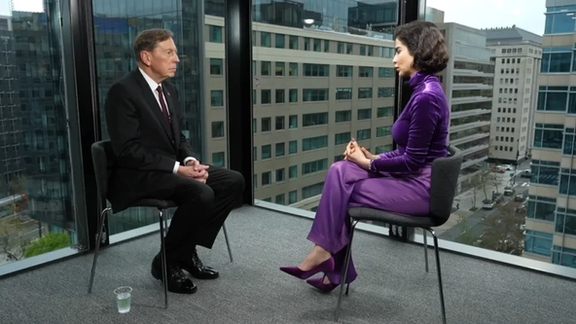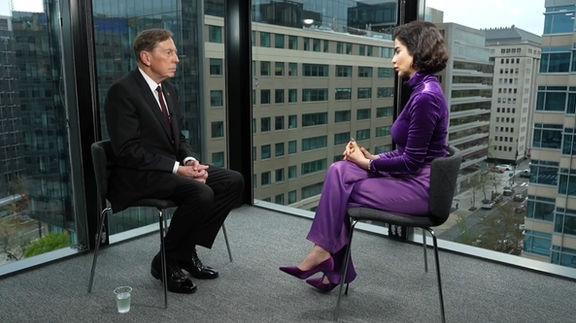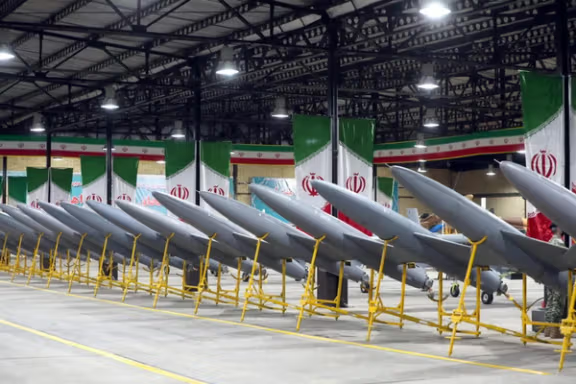Related Articles

Israeli Prime Minister Benjamin Netanyahu will seek to persuade the Trump administration during a visit to Washington to push for the complete dismantling of Iran’s uranium enrichment program, diplomatic sources in the Middle East told Iran International.
Israel believes that if the Islamic Republic is allowed to retain even a small part of its nuclear program, the sources added, it could rapidly resume enrichment once Trump’s presidency ends or anytime it deems conditions favorable.
The diplomats told Iran International that Israel assesses that Tehran’s sole aim in pursuing talks with the United States is to preserve its enrichment program.
The Israeli prime minister is meeting the US president at the White House, with Iran's nuclear issue among the key focuses of their negotiations, according to Netanyahu's office.
Netanyahu will not advise American officials against engaging in negotiations with Iran, the diplomats told Iran International, but he will urge them to make any talks conditional on the enrichment program's total end.
Earlier in the day, Axios reported that Netanyahu believes the chances of a nuclear deal between Tehran and Washington are extremely low but will present to Trump today how "a good deal should look like".
"Netanyahu wants the Libya model. Full dismantling of Iran's nuclear program", the report said, citing an Israeli official referring to a 2003 decision by Libya's leader Muammar Qadaffi to surrender weapons of mass destruction.
The veteran autocrat was deposed and killed in a Western-backed uprising in 2011.
Iran's Foreign Minister Abbas Araghchi said on Sunday that Washington can only dream of an agreement with Iran similar to the 2003 deal with Libya.
His comments came after Republican Senator Tom Cotton said the deal President Trump wants with Iran would be one that neutralizes Tehran's threat completely.
"He prefers a deal like Libya cut with the United States in 2003," Cotton said in an interview posted on X.
Israeli Prime Minister Benjamin Netanyahu will seek during his visit to Washington to persuade the Trump administration to push for the complete dismantling of Iran’s uranium enrichment program, diplomatic sources in the Middle East told Iran International.
Israel believes that if the Islamic Republic is allowed to retain even a small part of its nuclear program, the sources added, it could rapidly resume enrichment once Trump’s presidency ends or anytime it deems conditions favorable.
The diplomats told Iran International that Israel assesses that Tehran’s sole aim in pursuing talks with the United States is to preserve its enrichment program.
Netanyahu will not advise American officials against engaging in negotiations with Iran, the diplomats added, but he will urge them to make any talks conditional on the enrichment program's total end.
Any potential US airstrike would target not only Iran's nuclear facilities but also its air defense and missile capabilities in a bid to prevent possible retaliation, the former commander of US Central Command told Iran International.
In an exclusive interview with Iran International, former CENTCOM commander and CIA chief David Petraeus said Donald Trump would not stop at a limited attack on Iran's nuclear sites and would go after the Islamic Republic's air defense and missile capabilities.
"You probably have to take out some of the retaliatory capacity of Iran as well because you don't want to just take out the nuclear program and then have them go after the bases where we have forces, and that would then bring in all these other countries, of course," he said.
"This is not just a surgical attack on discrete nuclear capabilities. This is against the retaliatory capabilities, against the defense capability, and that's what has to be done if you're going to carry out this operation."


Any potential US airstrike would target not only Iran's nuclear facilities but also its air defense and missile capabilities in a bid to prevent possible retaliation, the former commander of US Central Command told Iran International.
The US military has in recent days deployed long-range bombers at a strategic Indian Ocean airbase amid escalation of tensions with Tehran, a move which presaged major bombing campaigns against Afghanistan in 2001 and Iraq in 2003.
In an exclusive interview with Iran International, former CENTCOM commander and CIA chief David Petraeus described the deployment as a step toward preparing for military action against Iran if it failed to reach a deal with the Trump administration over its disputed nuclear program.
"They are also steps to show that we are very serious and that you should not do this, and therefore trying to deter Iran from doing what would be unacceptable and would force the United States to take action," he said.
Petraeus said, "There's great concern about how close Iran is to the possibility of having a nuclear weapon. They're literally just one turn of the enrichment process from having weapons-grade uranium. That is something that President Trump has said he will never allow the Iranians to have a nuclear weapon."
Trump has warned Iran would be bombed if it did not agree to a new nuclear deal, prompting Iran's Supreme Leader Ali Khamenei to say on Monday that the Islamic Republic would deal a "strong blow" in retaliation for any attack.
Iran's retaliation
Iran has threatened to target American interests in the region, including its strategic Diego Garcia naval base in the Indian Ocean if it is attacked by the US.
However, Petraeus says Trump would not stop at a limited attack on the nuclear sites and would go after the Islamic Republic's air defense and missile capabilities.
"You probably have to take out some of the retaliatory capacity of Iran as well because you don't want to just take out the nuclear program and then have them go after the bases where we have forces, and that would then bring in all these other countries, of course," he said.

"This is not just a surgical attack on discrete nuclear capabilities. This is against the retaliatory capabilities, against the defense capability, and that's what has to be done if you're going to carry out this operation."
Plan to destroy Iran's nuclear program
Petraeus said he actually developed the plan to destroy Iran's nuclear program over 15 years ago when he was the commander of the US Central Command.
"It's publicly known that we actually rehearsed that plan one time inside the United States, with all the planes flying all the distances that they would have to fly, the refuelers, all the command and control, the jammers that drop, the munitions that we would drop, and so forth. And it all worked."

"We were prepared one time actually, to set the theater, in other words, to identify all the locations from which the planes would fly, where they would be based. The munitions were in place, the food, fuel, water, etc. All was set. We thought there was a likelihood of this. We told the White House we probably should get more prepared than we were."
'Israel proved it's possible'
Petraeus said Iran currently "does have more effective, more elaborate air and ballistic missile defenses" than in the past. However, he said, "Israel penetrated them twice, showing that that can be done."
Last October, Israeli air strikes against Iran's military sites knocked out the country's last three Russian-provided S-300 air defense missile systems, leaving the country "naked", Fox News reported citing US and Israeli officials.
The surface-to-air S-300s were the last in the Islamic Republic's arsenal after one was destroyed in an attack in April 2024 also likely carried out by Israel, Fox News quoted a senior US official as saying.
Still, Petraeus says Iran has "more retaliatory capability in terms of missiles and so forth, even though Israel dramatically reduced the ability of Iran to make solid fuel rocket engines from several per day to one or two per week."
Bunker busters
The former CENTCOM commander said the US military has bombs like the 30,000-pound GBU-57, aka Massive Ordnance Penetrator (MOP), that "is very accurate and can penetrate very hardened targets".
"It would be used against the most deeply buried hardened targets... you can imagine which target that might be," he said, adding that the use of such bunker busters is "not just possible but would be necessary" in a potential strike against Iran.
Iran’s most secretive nuclear facility, known as Fordow, has been carved deep into a mountain in central Iran, and is reportedly some 90 meters (295 feet) deep. It is also protected by several feet of reinforced concrete.
In 2012, defense experts contacted by Reuters believed the chances of a US strike against Fordow succeeding are slim. However, Petraeus says, "they can do enormous damage and destruction".

An Iranian cargo aircraft belonging to Iran's Revolutionary Guards transported weapons to Sudan's armed forces last month amid that country's ongoing civil war, two informed sources told Iran International.
A European intelligence source said the Boeing 747 with registration EP-FAB operated by Fars Air Qeshm, an airline owned by the powerful military organization, departed Tehran and landed in Port Sudan under flight number W5998 on March 17.
A second source with knowledge of the activities of the Islamic Revolutionary Guard Corps (IRGC) confirmed the shipment contained military equipment, including various types of drones.
The source added that the cargo was delivered to the Sudanese army.
A transnational paramilitary force, the IRGC spearheads Tehran's influence in the Middle East, including training and arming affiliates including Hamas, Hezbollah, the Houthis and Iraqi militias.
Iran previously used this same aircraft—bearing the same registration number—to fly a similar shipment from Bandar Abbas to Sudan in June/July 2024.
In recent months, multiple open-source investigations have pointed to an increased Iranian military role in Sudan. Satellite imagery published by BBC World Service showed Iranian drones stationed at a military site near Khartoum.
The BBC reported that Tehran had sent Ababil-3 and Mohajer-6 drones, models known for reconnaissance and strike capabilities. Iran has also supplied these drones to armed groups in Iraq, Venezuela, and Russia.
Images have emerged on social media that appear to show Iran-made anian-oduced eh-2 anti-armor missile Saeqeh-2 army positions.
The Sudanese military has been engaged in a two-year-long war against the Rapid Support Forces, a paramilitary group.
Iran’s ties with Sudan have fluctuated in recent years. In 2016 following the storming of Saudi diplomatic sites in Iran by protesters, Sudan severed diplomatic relations with Tehran along with other Saudi allies including the United Arab Emirates.
However, the two countries resumed ties in late 2023, amid the war between Israel and Hamas. In December, Sudan’s foreign minister visited Tehran, and the two governments announced the re-establishment of formal relations.
In February, Sudanese Foreign Minister Ali Youssef returned to Iran for further talks.
Last year, the Wall Street Journal reported that Iran had proposed an agreement to Sudan offering a warship in exchange for a permanent base. According to the report, the Sudanese government rejected the offer.
Even so, arms deliveries from Tehran appear to have continued. Bloomberg reported in December that Iran is backing the Sudanese army forces with weapons and drones as Tehran and its ally, Moscow, seek military bases in the Red Sea.
The report said Iran has delivered arms to Sudanese army forces and provided them with dozens of drones, helping tip the conflict against militia opponents but also giving Tehran a foothold in the region.
